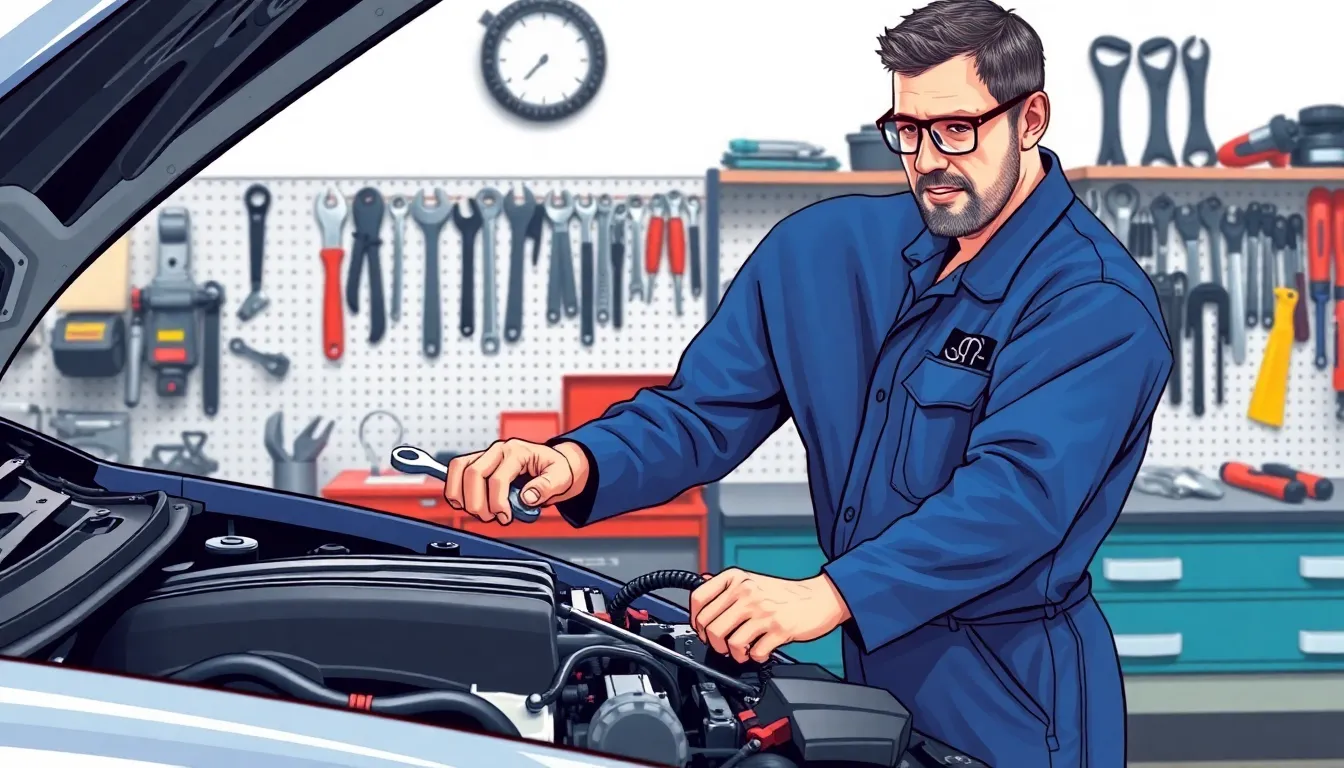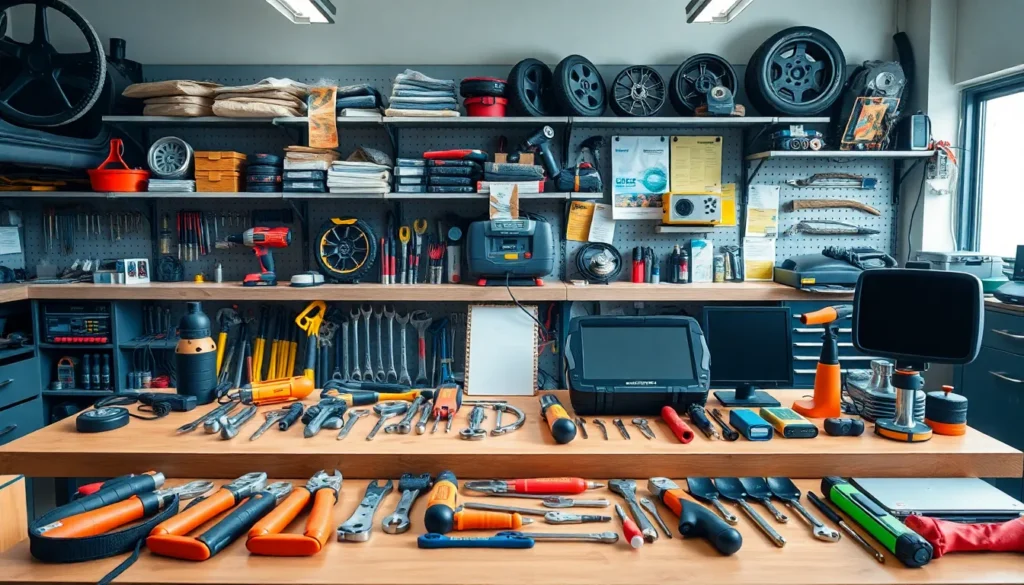Table of Contents
ToggleEvery car enthusiast knows that a well-equipped workshop is the secret sauce to automotive success. Whether it’s fixing a stubborn engine or performing routine maintenance, the right tools make all the difference. Imagine trying to change a tire with a spoon—frustrating, right? That’s why having a comprehensive automotive workshop tools list is crucial.
Importance Of A Comprehensive Tools List
A comprehensive tools list is crucial for any automotive workshop. This list serves as a roadmap, guiding mechanics and enthusiasts through the various tasks involved in vehicle maintenance and repair. Having the right tools on hand prevents delays and increases efficiency. An organized workshop with a complete tools inventory offers a smooth workflow, allowing mechanics to focus on the task at hand.
Many automotive tasks require specific tools tailored for precision work. For instance, specific socket sizes best fit various bolts and nuts. Using improper tools can lead to damaged parts or even injury. This highlights the need for a detailed tools list that encompasses a diverse range of essentials.
An effective tools list should include hand tools, power tools, and diagnostic equipment. Hand tools encompass wrenches, pliers, and screwdrivers. Power tools include drills and impact wrenches. Diagnostic equipment comprises OBD-II scanners and multimeters. These categories encompass a workshop’s core needs.
Moreover, keeping the tools list updated ensures that mechanics acquire the latest technology available. Emerging tools can increase productivity and improve safety measures. Regular inventory checks prevent situations where mechanics discover missing or outdated equipment during critical repair tasks.
A printed or digital PDF format of this tools list aids mechanics in rapidly referencing needed tools. Maintaining a comprehensive tools list increases overall effectiveness and reduces downtime. With the right tools available, mechanics feel confident tackling even the most challenging automotive projects. This confidence directly impacts the quality of service provided in the automotive workshop environment.
Essential Hand Tools

A collection of essential hand tools forms the backbone of any automotive workshop. Having the right tools enables mechanics to perform repairs efficiently and effectively.
Wrenches
Wrenches are crucial for loosening and tightening bolts and nuts. Various types of wrenches exist, including adjustable, socket, and torque wrenches. An adjustable wrench ensures versatility, adapting to different sizes of fasteners. Socket wrenches provide ease of use in tight spaces, while torque wrenches guarantee proper tension when tightening bolts. Mechanics should prioritize adding a complete set of both standard and metric sizes to tackle various automotive projects.
Screwdrivers
Screwdrivers are indispensable for assembling and disassembling components. Flathead and Phillips head screwdrivers represent the two primary styles of screwdrivers found in workshops. A set of various sizes ensures coverage for different screw types. Choosing high-quality screwdrivers reduces the likelihood of stripping screws. Magnetic tips on screwdrivers also facilitate retrieving dropped screws and enhance efficiency during work.
Pliers
Pliers serve multiple functions, from gripping to cutting wires and holding components in place. Mechanics frequently utilize needle-nose pliers for working in tight areas. Combination pliers offer versatile gripping power, enabling users to tackle various tasks. Wire cutters provide precision when managing electrical components. Including a range of pliers ensures readiness for any situation encountered in automotive repair.
Power Tools For Automotive Work
Power tools play a crucial role in automotive workshops. They provide the speed and efficiency necessary for various repair and maintenance tasks.
Drills
Drills are essential for creating holes in various materials, from metal to plastic. A high-quality electric drill should feature adjustable speed settings, allowing users to control torque according to the project’s demands. Mechanics often choose corded drills for continuous power or cordless drills for mobility and convenience. Selecting the right drill bit types, such as twist bits for metal and masonry bits for other materials, ensures compatibility with different tasks. Having a versatile drill set streamlines processes, making it an invaluable addition to any workshop.
Impact Wrenches
Impact wrenches deliver high torque output for loosening and fastening bolts and nuts. A pneumatic impact wrench provides extreme power and is ideal for heavy-duty applications, while a cordless electric version offers flexibility and ease of use. Both types reduce the manual effort required, making tasks like changing tires quicker and more efficient. The choice of sockets must align with the vehicle’s specifications, ensuring a perfect fit. A reliable impact wrench enhances productivity, saves time on labor-intensive jobs, and makes routine maintenance more manageable.
Specialty Tools
Specialty tools play a crucial role in an automotive workshop, enabling mechanics to tackle specific tasks effectively.
Diagnostic Equipment
Diagnostic equipment helps identify issues within a vehicle’s systems. OBD-II scanners allow mechanics to read error codes from a car’s onboard computer. These scanners are essential for diagnosing engine problems and ensuring timely repairs. Multimeters measure electrical values, aiding in troubleshooting electrical systems. Using oscilloscopes, technicians can visualize waveforms related to sensor signals, providing deeper insights into vehicle performance. Additionally, smoke machines detect leaks in vacuum systems, ensuring components function correctly. Access to reliable diagnostic tools improves repair accuracy and reduces time spent on guessing what might be wrong.
Engine Hoists
Engine hoists facilitate the removal and installation of engines with safety and ease. Various models, including steel-frame and hydraulic options, offer different lifting capacities. A robust hydraulic hoist can lift heavy engines, while portable hoists provide versatility in tight spaces. Adjustable arms on some hoists allow for better positioning, increasing efficiency during engine swaps. Many mechanics find that having a dedicated engine hoist saves both time and effort. Using an engine hoist minimizes the risk of injury that comes with manual lifting, enhancing overall workshop safety. Properly selected hoists contribute significantly to successful engine repair and replacement tasks.
Safety Equipment
Safety equipment plays a crucial role in maintaining a secure automotive workshop environment. Various items protect mechanics from hazards associated with automotive repair and maintenance tasks.
Personal Protective Equipment (PPE)
Personal protective equipment includes essential items like safety goggles, gloves, and steel-toed boots. Safety goggles shield eyes from flying debris, while gloves protect hands from chemicals and sharp objects. Steel-toed boots prevent foot injuries, especially in workshops where heavy tools and parts are present. Additionally, using respiratory protection is vital when working with toxic substances or in areas with poor ventilation. Having a complete set of PPE encourages a safer work environment and reduces the risk of accidents.
Fire Extinguishers
Fire extinguishers serve as a critical safety measure in automotive workshops. Workshops often contain flammable materials, making fire extinguishers an essential item. Class B extinguishers are suitable for fires involving flammable liquids, which are common in automotive settings. Regular maintenance and inspection of fire extinguishers ensure they function properly when needed. Placing extinguishers in easily accessible locations enhances their effectiveness and quick response during emergencies. Proper training on how to use this equipment can save lives and protect property in case of a fire.
A comprehensive automotive workshop tools list is crucial for anyone looking to excel in vehicle maintenance and repair. By ensuring access to the right hand tools power tools and diagnostic equipment mechanics can enhance their efficiency and effectiveness. Regularly updating this list not only keeps the workshop organized but also helps avoid delays caused by missing or outdated tools.
Incorporating specialty tools and safety equipment further elevates the workshop’s capabilities while protecting those who work within it. With the right tools and a focus on safety a mechanic can confidently tackle even the most challenging automotive projects, leading to improved service quality and customer satisfaction.




